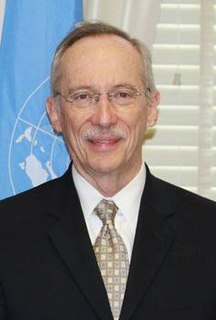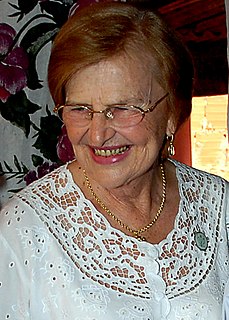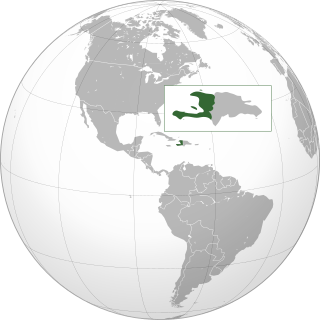Related Research Articles

Haiti, officially the Republic of Haiti, and formerly known as Hayti, is a country located on the island of Hispaniola in the Greater Antilles archipelago of the Caribbean Sea, to the east of Cuba and Jamaica and south of The Bahamas and the Turks and Caicos Islands. It occupies the western three-eighths of the island which it shares with the Dominican Republic. To its south-west lies the small island of Navassa Island, which is claimed by Haiti but is disputed as a United States territory under federal administration. Haiti is 27,750 square kilometers (10,714 sq mi) in size, the third largest country in the Caribbean by area, and has an estimated population of 11.4 million, making it the most populous country in the Caribbean.

The economy of Haiti is a free market economy with low labor costs. Haiti's estimated population in 2018 was 11,439,646. The British The Economist wrote in 2010:
Long known as the poorest country in the Western hemisphere, Haiti has stumbled from one crisis to another since the Duvalier years.

The United Nations Stabilisation Mission in Haiti, also known as MINUSTAH, an acronym of the French name, was a UN peacekeeping mission in Haiti that was in operation from 2004 to 2017. The mission's military component was led by the Brazilian Army and the force commander was Brazilian. The force was composed of 2,366 military personnel and 2,533 police, supported by international civilian personnel, a local civilian staff and United Nations Volunteers.
Haiti—an island country 600 miles off the coast of the U.S. state of Florida—shares the Caribbean island of Hispaniola with the Dominican Republic. Haiti has received billions in foreign assistance, yet persists as one of the poorest countries. There have been more than 15 natural disasters since 2001 including tropical storms, flooding, earthquakes and hurricanes. The international donor community classifies Haiti as a fragile state. Haiti is also considered a post-conflict state—one emerging from a recent coup d'état and civil war.

After the Haitians gained independence from French colonial rule in the Haitian Revolution of 1804, the French returned in 1825 and demanded that the newly independent country pay the French government and French slaveholders the modern equivalent of US$21 billion for claiming slaveowner's property and the land that they had turned into profitable sugar and coffee-producing plantations. This independence debt was financed by French banks and the American Citibank, and finally paid off in 1947.

Edmond Auguste Mulet Lesieur is a Guatemalan diplomat.
The Institute for Justice & Democracy in Haiti (IJDH) is a non-profit organization based in Boston, Massachusetts, USA that seeks to accompany the people of Haiti in their non-violent struggle for the consolidation of constitutional democracy, justice and human rights. IJDH distributes information on human rights conditions in Haiti, pursues legal cases in Haitian, U.S. and international courts, and promotes grassroots advocacy initiatives with organizations in Haiti and abroad. IJDH was founded in the wake of the February 2004 coup d'état that overthrew Haiti's elected, constitutional government. The institute works closely with its Haitian affiliate, the Bureau des Avocats Internationaux (BAI).
Susan Elizabeth Hough is a seismologist at the United States Geological Survey in Pasadena, California, and scientist in charge of the office. She has served as an editor and contributor for many journals and is a contributing editor to Geotimes Magazine. She is the author of five books, including Earthshaking Science (Princeton).

Haiti has a sizeable diaspora, present majoritarily in the United States, Dominican Republic, Cuba, Canada, France, the Bahamas, Brazil, and Chile. They also live in other countries like Belgium, Turks and Caicos, Mexico, Puerto Rico, and the U.S. Virgin Islands, among others.

Haiti–United States relations are bilateral relations between Haiti and the United States.

Caracol is a commune in the Trou-du-Nord Arrondissement, in the Nord-Est department of Haiti. It has 6,236 inhabitants.

The response to the 2010 Haiti earthquake included national governments, charitable and for-profit organizations from around the world which began coordinating humanitarian aid designed to help the Haitian people. Some countries arranged to send relief and rescue workers and humanitarian supplies directly to the earthquake damage zones, while others sought to organize national fund raising to provide monetary support for the nonprofit groups working directly in Haiti. OCHA coordinates and tracks this on a daily basis. The information is disseminated through the UN news and information portal, ReliefWeb. As of September 5, 2013, ReliefWeb have reported a total relief funding of $3.5 billion given.

A catastrophic magnitude 7.0 Mw earthquake struck Haiti at 16:53 local time on Tuesday, 12 January 2010. The epicenter was near the town of Léogâne, Ouest department, approximately 25 kilometres (16 mi) west of Port-au-Prince, Haiti's capital.

The humanitarian response by national governments to the 2010 Haiti earthquake included numerous national governments from around the world pledging to send humanitarian aid to the Haitian people. The United Nations Office for the Coordination of Humanitarian Affairs (OCHA) and ReliefWeb are coordinating and tracking this aid.

The humanitarian responses by non-governmental organizations to the 2010 Haiti earthquake included many organisations, such as international, religious, and regionally based NGOs, which immediately pledged support in the aftermath of the 2010 Haiti earthquake. Besides a large multi-contingency contribution by national governments, NGOs contributed significantly to both on-the-ground rescue efforts and external solicitation of aid for the rescue efforts.
This article describes humanitarian responses from "for-profit" organizations, such as business corporations, following the January 12, 2010, earthquake in Haiti.

Corruption in Haiti is a scourge that corrodes all attempts to establish a rule of law, a sustainable democracy, and to improve the quality of life of Haiti's people. Haiti's corruption perception index is 25.44 in Transparency International's 2017 Corruption Perception Index, ranking the country 157th place out of 180 countries.
After the 2010 Haiti earthquake, the United States enabled a Temporary Protected Status (TPS) for Haitians currently residing in and those that would take refuge in the United States within a year of the earthquake. This would allow Haitians protection from the instability Haiti experienced due to the earthquake. This also created the opportunity for Haitians in the United States to help rebuild the Haitian economy. However, Haitians that did not meet the requirements for the TPS or had committed one felony/two misdemeanors, were deported. These deportations have been continuous for the last decade. Recently, under the Trump Administration, efforts to end TPS for all Haitians in the United States has put a lot of strain on the tens of thousands of Haitians living in the United States. Deportations of undocumented Haitians with no criminal offenses have increased significantly over the last 4 years. During the year 2020, among the Coronavirus Pandemic, deportations to a country with poor healthcare have increased. Today, Haitians still have hope to keep their Temporary Protected Status.

Haiti–Turkey relations have been limited due to geographical distance until the opening of a Turkish Cooperation and Coordination Agency (TIKA) in response to the 2010 Haiti earthquake.

Squatting in Haiti is the occupation of unused land or abandoned buildings without the permission of the owner. Following the Haitian Revolution (1791–1804), squatters acquired smallholdings across the country. As the capital Port-au-Prince grew, so did the informal settlements ringing it. In the Bel Air district, there is some squatting whilst most people pay rent, building their own homes. In 2004, President Jean-Bertrand Aristide was deposed in a coup and poor areas such as Bel Air and Cité Soleil erupted in violence. Peacekeepers from the United Nations Stabilisation Mission in Haiti later evicted ex-combatants squatting in the house of Aristide.
References
- ↑ Bill Summary & Status Archived 2012-12-14 at the Wayback Machine at thomas.loc.gov (Library of Congress)